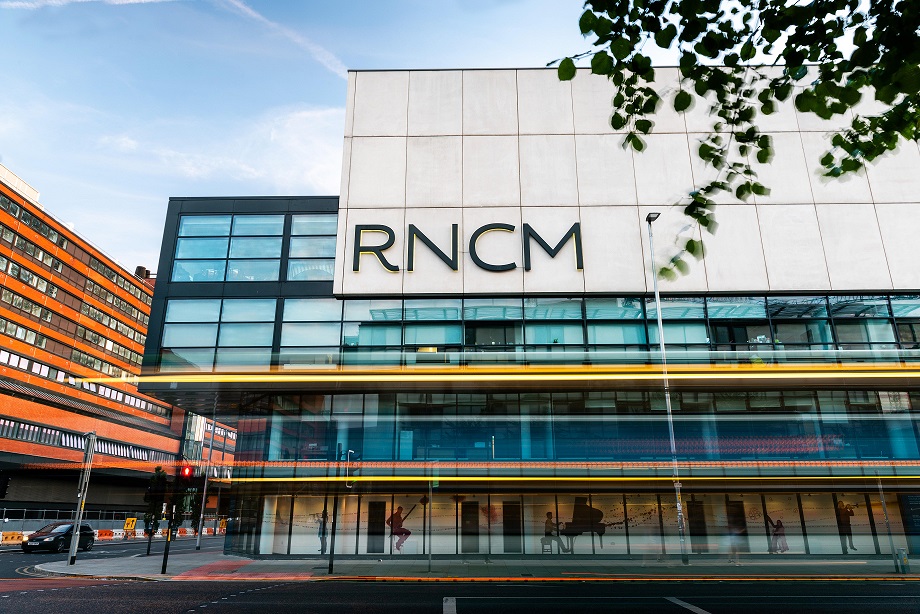
Paul Hindmarsh’s considered curatorship of the RNCM Brass Band Festival continues to ensure that it remains the singularly most important artistic event in UK banding.
This year’s weekend in Manchester provided a pertinent reminder, especially at a time when banding has become self-obsessed with the pursuit of excellence through the increasingly redundant structures of contesting, that it is also able to offer much, much more to a wider audience as an art form.
He has used his role as Festival Artistic Director to provide an overview arc of brass banding’s place in the past, present and future hinterland of the UKs music making - both amateur and professional.
It was emphasised not only by the performances, which were without doubt of the highest quality, but by the diverse choice of repertoire from which they were crafted.
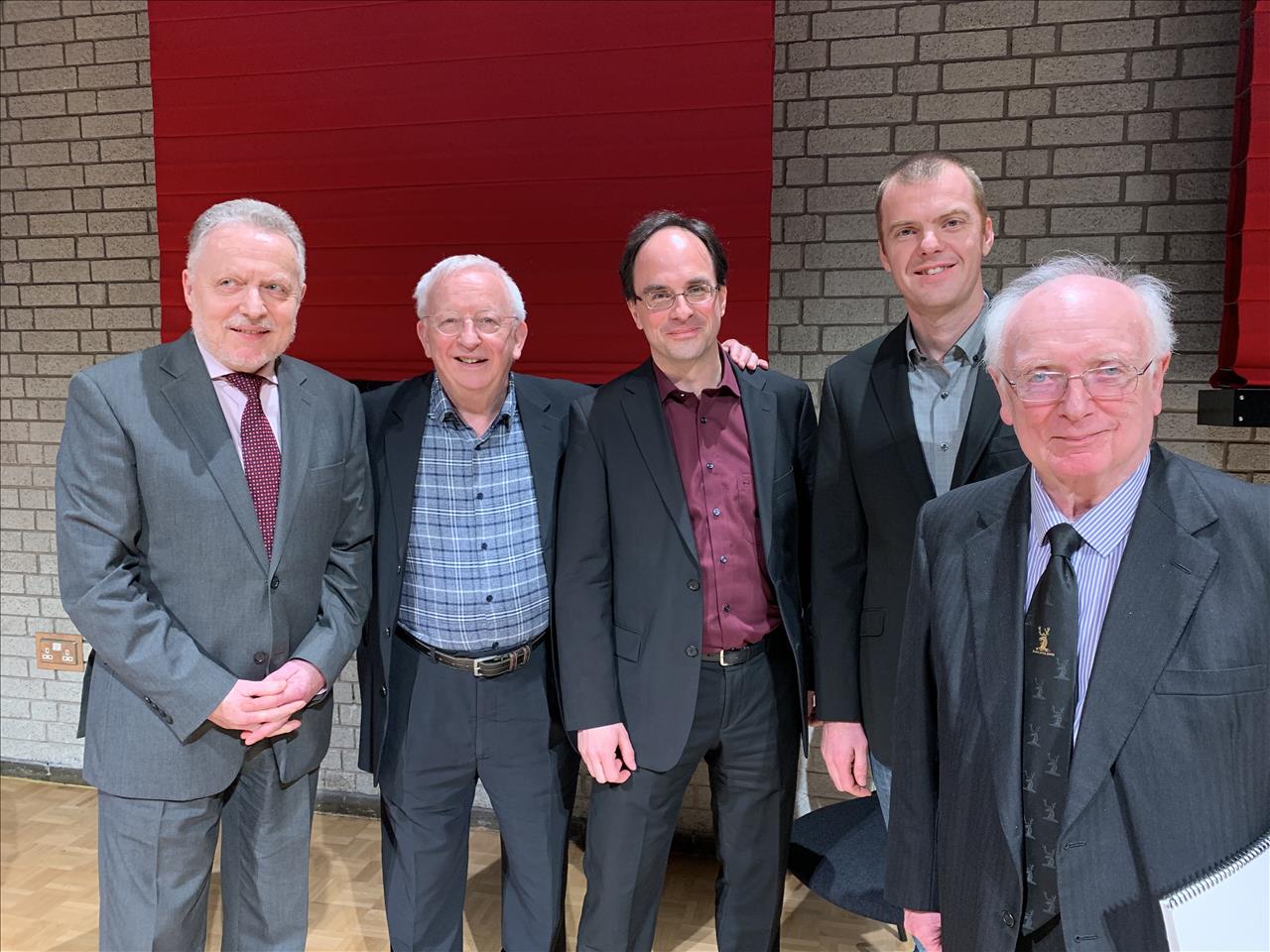
Paul Hindmarsh with featured composers Edward Gregson, Oliver Waespi, Thierry Deleruyelle and Philip Wilby
Those fortunate enough to be present to listen to Foden’s poetic interpretation of Granville Bantock’s ‘Prometheus Unbound’ or Cory’s panoramic approach to Edward Gregson’s ‘Of Men and Mountains’ would attest to that.
Connective tissue
The connective tissue that has fed the link between the artistic past and present was remarkable – the future equally embraced with the engrossing soundscapes created by Brighouse & Rastrick and Tredegar on ‘From Koris By’ by Paul McGhee and 'A Dialogue of Transmogrified Souls' by Daniel Hall.
In addition, the sheer artistry that saw Philip Cobb send jaws dropping as he moulded the Tomlinson ‘Cornet Concerto’ to his will and Les Neish command centre stage on the Golland ‘Tuba Concerto’ could never be seen as exceptions to the rule of traditional ‘featured soloists’. These were world class artists showcasing their talents in full.
In addition the sheer artistry that saw Philip Cobb send jaws dropping as he moulded the Tomlinson ‘Cornet Concerto’ to his will and Les Neish command centre stage on the Golland ‘Tuba Concerto’ should never be seen as exceptions to the rule of traditional ‘featured soloists’. These were world class artists showcasing their talents in full.
Artistic inclusivity
And what possibilities lie ahead for the banding movement to embrace artistic inclusivity if we can add to the theatrical splendour that engulfed the audience at the RNCM Concert Hall with the performance of ‘An Age of Kings’ given by Black Dyke or the delicate refinement employed by Fairey to put a fresh sheen of veneer on the polished vibrancy of Gilbert Vinter and Goff Richards?
All this, and the next generation of performers with both RNCM Bands and ensembles, the Greater Manchester Youth Brass Band and Young Artist Spotlight were well served by music that opened new doors to stylistic understanding rather than merely closing them tight with technical competency.
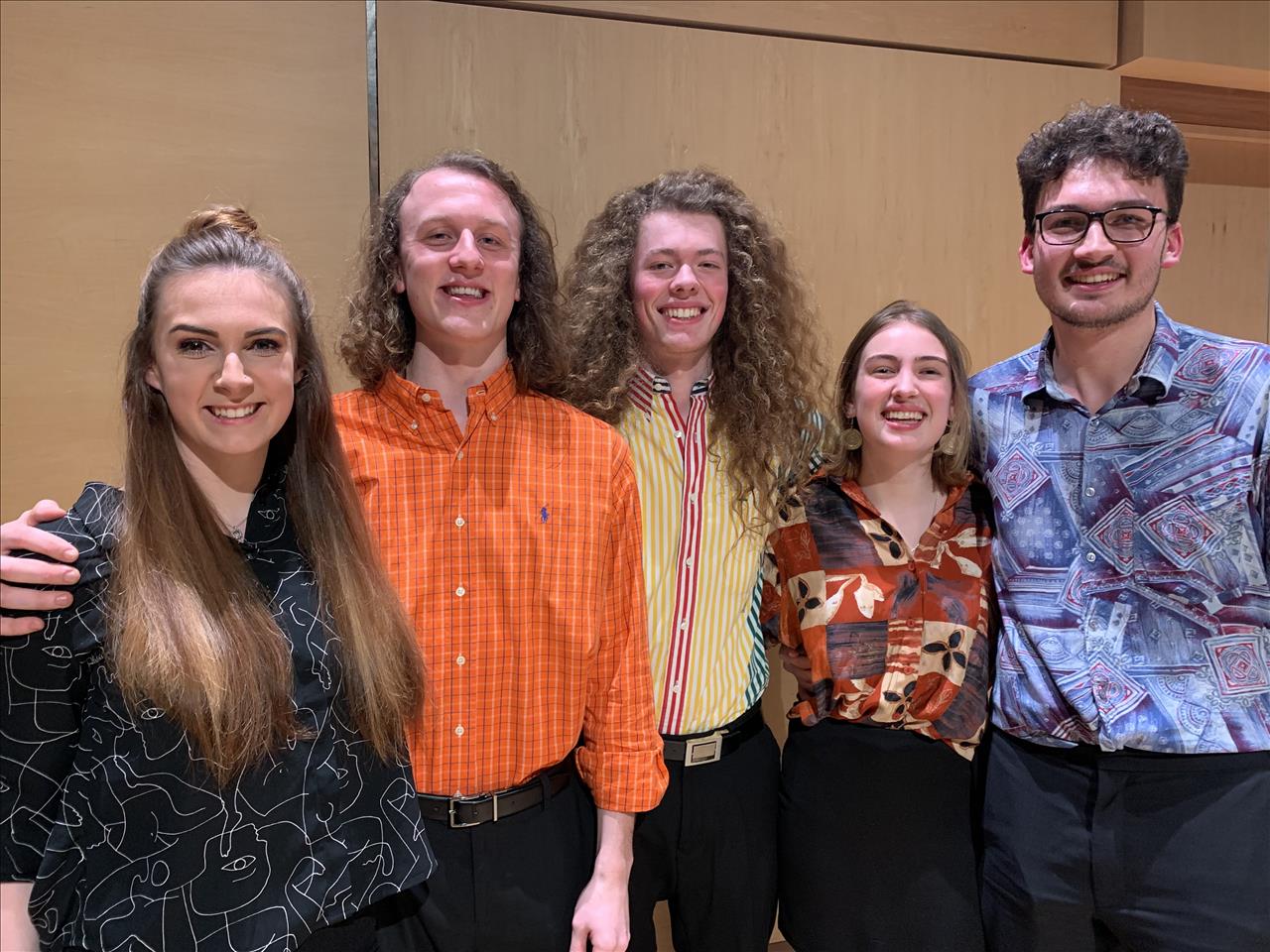
The RNCM student quintet All Saints Brass provided a great Friday night aperitif
Where else would you get a Friday night student aperitif as sardonically dark humoured as that provided by the All Saints Brass quintet playing music as surreal as that of Werner Pirchner’s ‘Do You Know Emperor Joe?’ – followed by a rare treat of hearing ‘Paganini Variations’ restored to its rightful glory as Foden’s gave a Stakhanovite concert performance moulded by artistic endeavour.
Where else would you get a Friday night student aperitif as sardonically dark humoured as that provided by the All Saints Brass quintet playing music as surreal as that of Werner Pirchner’s ‘Do You Know Emperor Joe?’ – followed by a rare treat of hearing ‘Paganini Variations’ restored to its rightful glory as Foden’s gave a Stakhanovite concert performance moulded by artistic endeavour.
Busby Berkeley
Brighouse & Rastrick explored horizons industrial and agricultural and Black Dyke led a cast the size of a Busby Berkeley production with a set that embraced Gods, Pilgrims and Kings. Cory went from lost villages to the moon and back.
It was music making that reached out rather than looked in (a notable feature being that concerts were given in association with The Worshipful Company of Musicians, John Golland Trust, Brass Bands England, BrassPass.tv and Buffet Crampon) – partnerships that could well provide the backbone for the RNCM Festival to flourish further in the years to come.
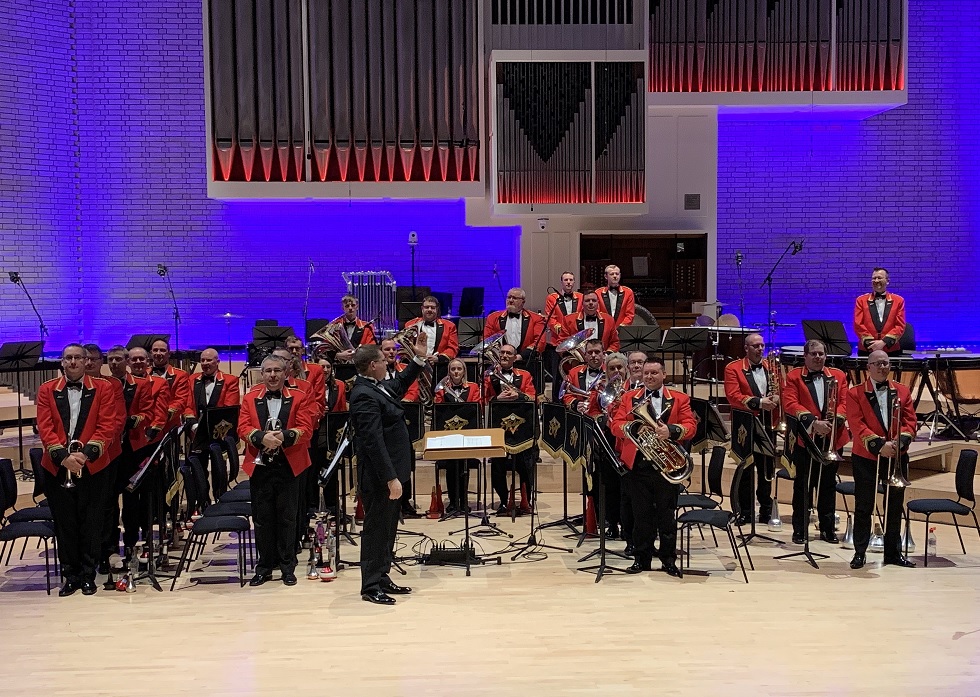
Foden's and Michael Fowles take the applause after their Friday evening performance
That in itself was something to savour, especially as the wider context in which the festival was presented saw intelligently led discussions on the insights and experiences of women in brass bands and the future of brass band repertory.
Melting pot
They helped make the RNCM refectory area become a multi-lingual melting pot of people speaking the same language: Dutch, Belgians, Norwegians, Americans, Swiss, French, Spanish, Irish, Welsh and many more - all talking brass band music making.
No one was quibbling about results or decisions, wrong notes – just revelling in performances and debate that had relevance and importance.
They helped make the RNCM refectory area become a multi-lingual melting pot of people speaking the same language: Dutch, Belgians, Norwegians, Americans, Swiss, French, Spanish, Irish, Welsh and many more - all talking brass band music making.
New voices were heard - from the emerging compositional talents of Andy Wareham, Jay Richardson, Daniel Hall and Christopher Bond, to those who have already made their names in this and other artistic areas, such as Christopher Gunning (who wrote for the television series ‘Poirot’), Thierry Deleruyelle (whose ‘Cornet Concerto’ had a finely judged rhapsodic scope) and Oliver Waespi (his ‘Trombone Concerto’ was an ever changing expression of linear vision).
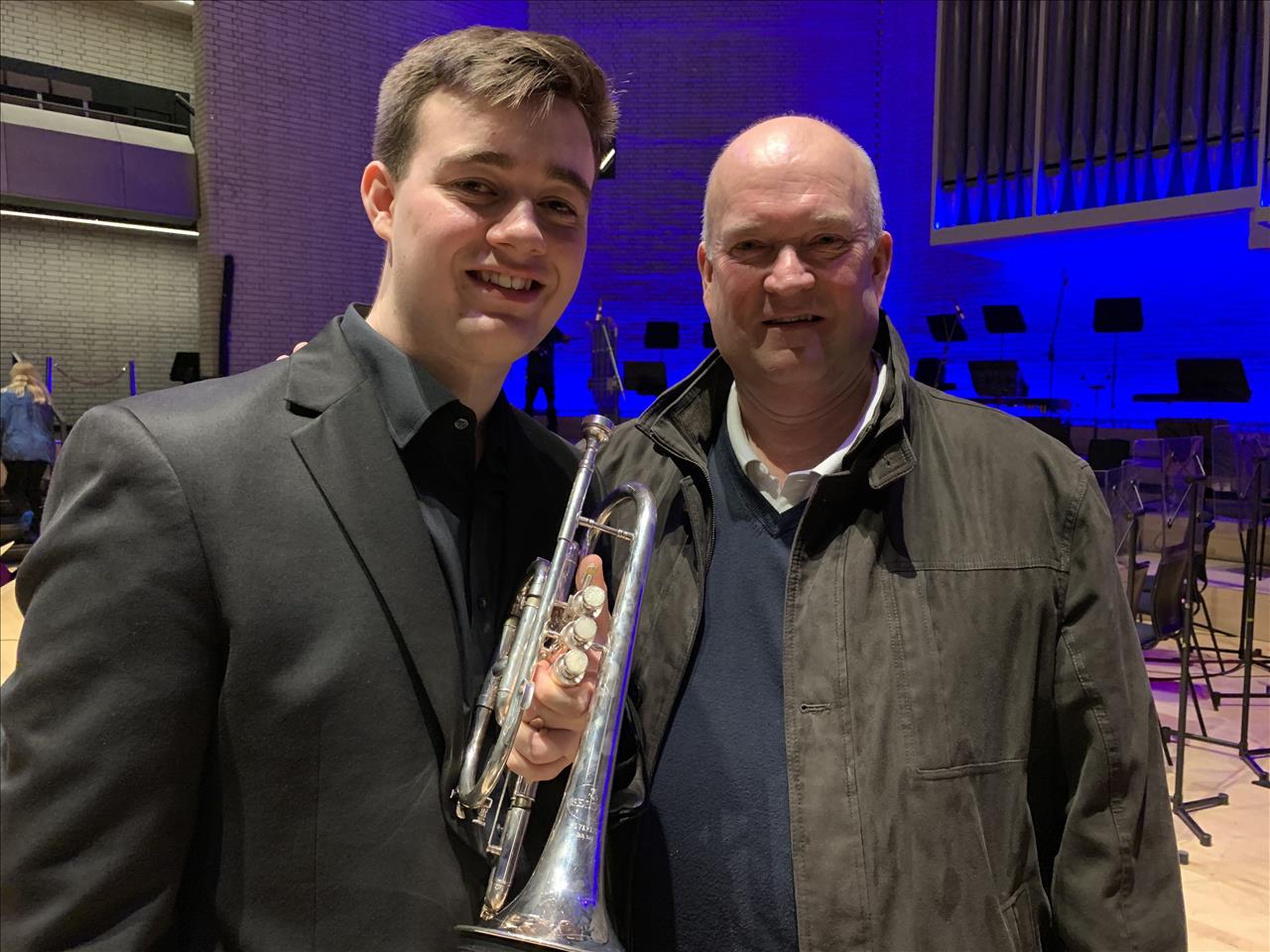
Thomas Nielsen with his father after providing a fine Young Artist Spotlight recital performance
It was such an engaging treat to hear the substantive works of Edward Gregson and Philip Wilby, on what was a celebration of the 75th and 70th birthdays respectfully - especially when revived in a manner that revealed once more both their mastery of writing for the medium as well as the scope of their musical imaginations.
Peeled away
Years of neglect and musical abuse where peeled away like a heritage restorer removing layers of darkened varnish from an of master painting with the finely attuned renditions of ‘Dances & Arias’, ‘A Lowry Sketchbook’ and ‘Rococo Variations’ and more.
Hearing the duo (joined by Oliver Waespi, Thierry Deleruyelle) talk about their own early inspirations as well as the future hopes for brass band repertoire was an education in itself in the Saturday afternoon pre-concert discussion.
Years of neglect and musical abuse where peeled away like a heritage restorer removing layers of darkened varnish from an of master painting with the finely attuned renditions of ‘Dances & Arias’, ‘A Lowry Sketchbook’ and ‘Rococo Variations’ and more.
Little wonder Edward Gregson’s latest work (a joint commission with the British Open, Norwegian, Swiss, Belgian and Dutch National Championships) is so eagerly awaited.
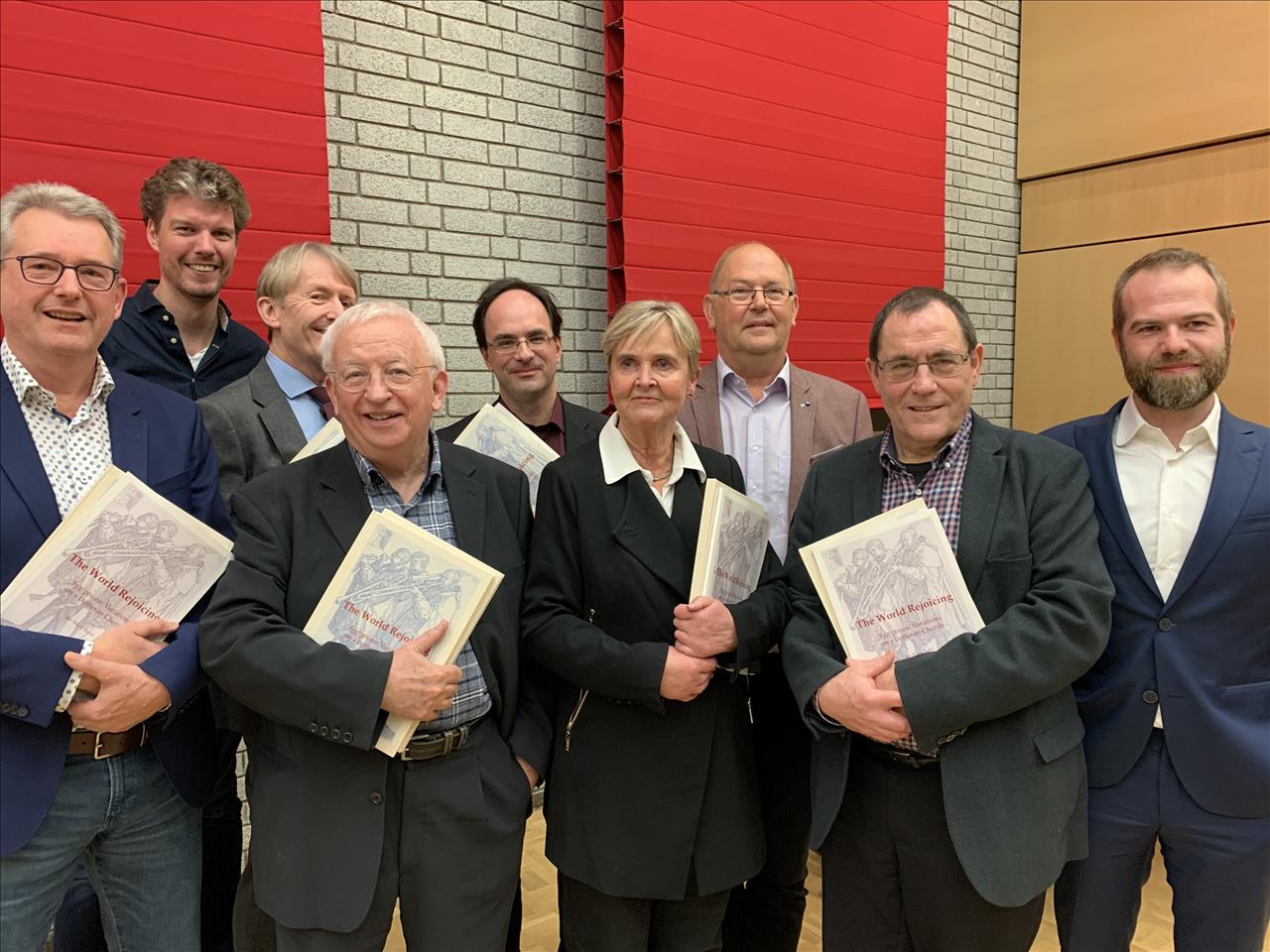
An international flavour to the music to come from Edward Gregson in 2020 and 2021
Meanwhile, Siobhan Bates and Thomas Nielsen, who provided an absorbing ‘Young Artist’ solo spotlight on Sunday afternoon, will surely go on to enjoy varied and rewarding careers of their own in the brass band world and beyond, given their talents. Their recital performances were mature, assured and professional.
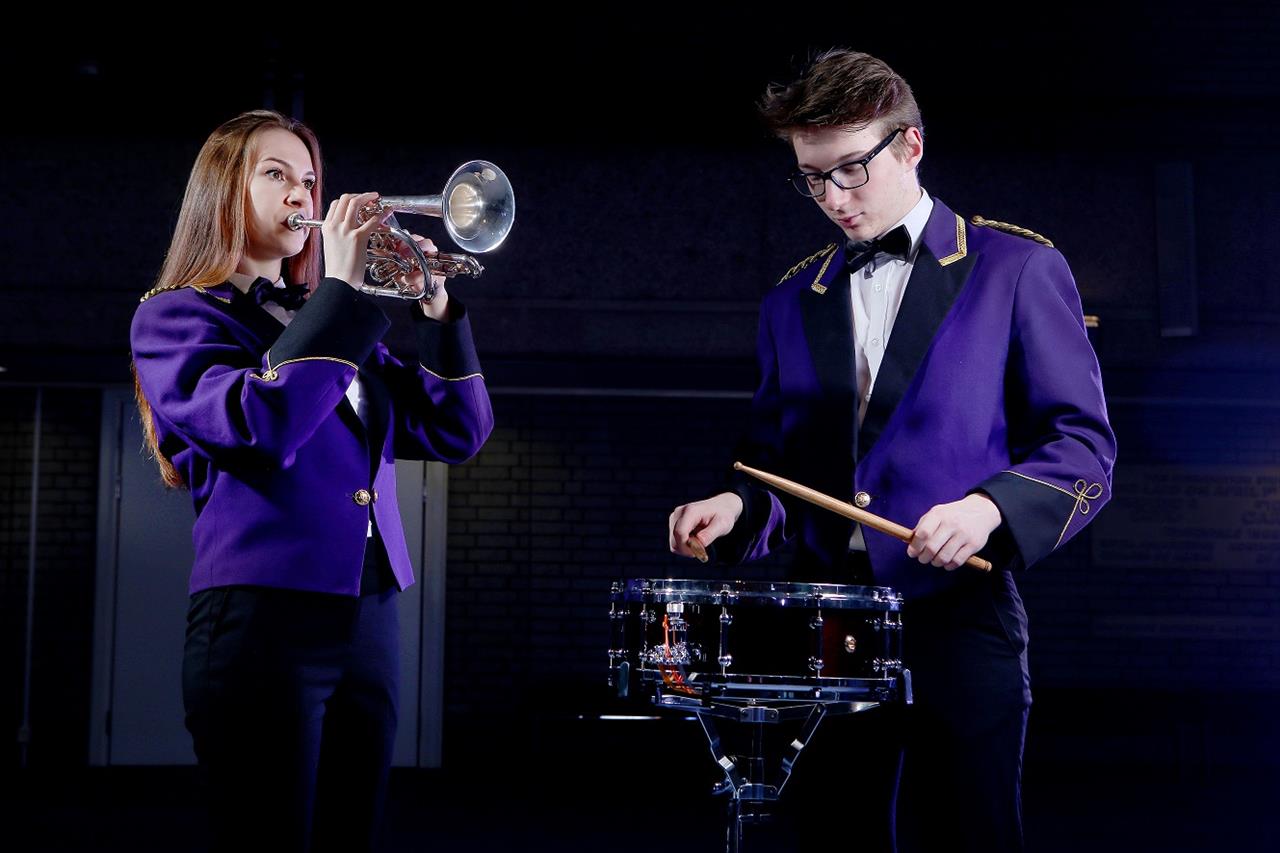
One of the images taken by Lorne Campbell for publication by The Daily Telegraph newspaper
Copyright: Lorne Campbell
It will also be interesting to see what opportunities open up for conductors Cathryn-Jane Rogers, Jane Ellis, Helen Douthwaite-Teesdale (who were featured in the Conducting Workshop), and the very assured Anna Hartmann who conducted the RNCM Brass Band. These are also significant talents that deserved to be embraced.
Paul Hindmarsh is the standard bearer for all that we should stand behind if we want a brass band movement, and especially the music we perform, to prosper into the third decade of the 21st century.
Questions
In its way, the questions that arose from the interesting ‘Women in Brass Bands’ discussion that featured impressive contributions from leading professionals in their fields of expertise, also shone a light of just how far the banding movement has still to move forward, and not just musically, to be seen as truly progressive and inclusive.
It was however good to note that the 'Daily Telegraph' used an image with a strong female presence by photographer Lorne Campbell to advertise the festival without recourse to any snide editorial byline (above).
And that was the feeling you were left with as the 28th RNCM Brass Band Festival came to an end for another year.
Paul Hindmarsh is the standard bearer for all that we should stand behind if we want a brass band movement, and especially the music we perform, to prosper into the third decade of the 21st century.
Hopefully there is now a long queue forming up behind him to help in his ongoing task.
Iwan Fox













